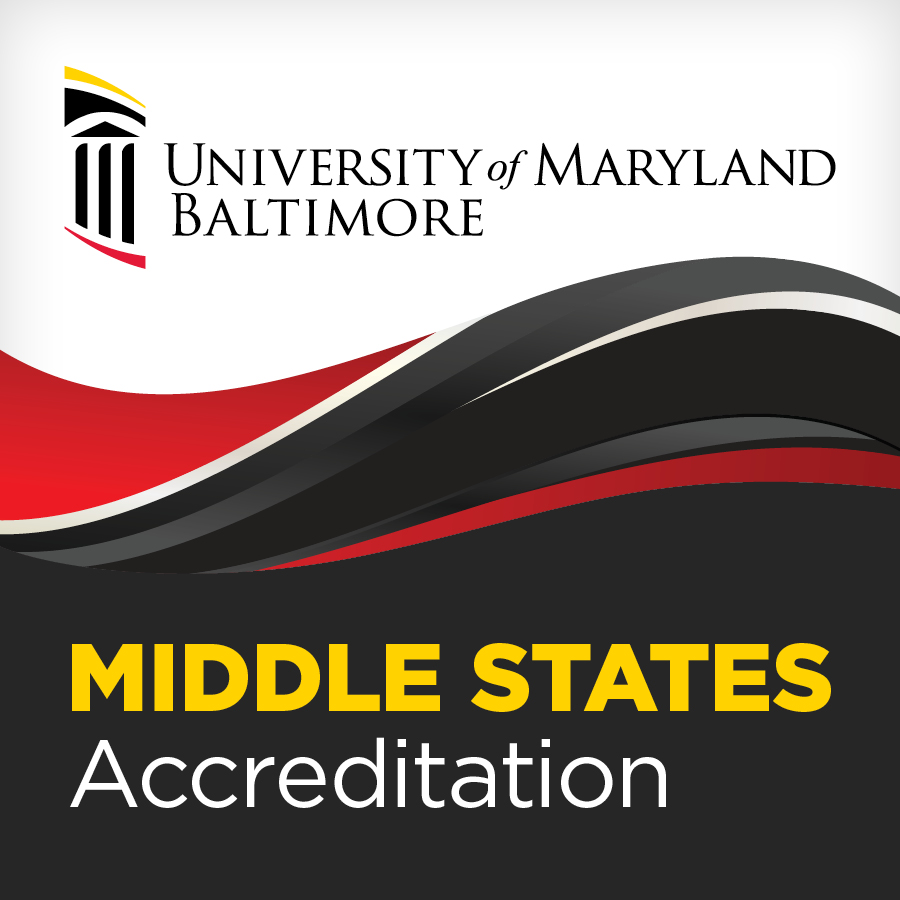UMB Receives Reaccreditation from Middle States Commission on Higher Education
July 09, 2025 Jen Badie
The 2½-year process culminates in “a spectacular report” that will be key to the formation of the University’s next Strategic Plan.
After a 2½-year process that included weekly meetings, several Universitywide town halls, a 108-page Self-Study report, and a peer evaluation visit, the University of Maryland, Baltimore (UMB) learned in July that it has earned reaccreditation from the Middle States Commission on Higher Education (MSCHE).
“We couldn't have gotten to this point without the hard work, dedication, commitment, and support of so many people,” said provost and executive vice president Roger J. Ward, EdD, JD, MSL, MPA, who served as MSCHE Steering Committee co-chair with University of Maryland School of Dentistry Dean Mark A. Reynolds, DDS, PhD, MA.
Every eight years, UMB goes through an evaluation by MSCHE, one of seven institutional accreditors recognized by the U.S. Department of Education.
“The MSCHE accreditation is important because it is the certification UMB needs to continue to receive federal funds to support our education and research missions and reaffirms that we are meeting high standards in our pursuit of excellence in health, law, and human services,” UMB President Bruce E. Jarrell, MD, FACS, said in announcing the reaccreditation to the UMB community in a letter July 9.
As part of the accreditation process, the University completed an institutional Self-Study report that carefully considered its educational programs and services, with particular attention to student learning and achievement, and determined how well these programs and services accomplish its goals, fulfill its mission, and meet MSCHE standards.
The self-study examined seven MSCHE standards:
- Mission and Goals
- Ethics and Integrity
- Design and Delivery of the Student Learning Experience
- Support of the Student Experience
- Educational Effectiveness Assessment
- Planning, Resources, and Institutional Improvement
- Governance, Leadership, and Administration
In the Self-Study, UMB identified four areas as institutional priorities: near-campus vibrancy; strategic enrollment growth; equity, diversity, and inclusion integration; and institutional effectiveness.
Gregory C. Spengler, MPA, associate vice president for institutional effectiveness and MSCHE accreditation liaison officer, said the Self-Study findings will be key to the formation of UMB’s next Universitywide strategic plan.
“Affirmation of our institutional accreditation by the Middle States Commission on Higher Education confirms that UMB has the leadership, talent, and resources required of an exemplary institution,” he said. “I have no doubt that UMB has the determination to overcome upcoming challenges as we pursue new and better ways to accomplish our mission.”
Jarrell added, “The Self-Study process was marked by deep engagement across the University, thoughtful introspection about how well we execute our mission, and innovative ideas for accelerating progress in the years ahead.”
At the end of the peer evaluation visit in early April that included meetings with faculty, staff, and students around campus, University leaders and members of the MSCHE Steering Committee learned that the MSCHE peer evaluation team had found that UMB “appears to meet all of the requirements of affiliation.” Led by Joseph McCarthy, PhD, provost and senior vice chancellor, University of Pittsburgh, the peer evaluation team forwarded a proposed action to MSCHE, whose review was the final step of the reaccreditation process at its meeting June 26.
“That was a spectacular report that is representative of UMB and truly exemplifies what we are and who we are at the University,” Ward said after the oral report was presented.
In the final report, the peer evaluation team praised UMB for its strong faculty and academic programs, including the University’s investment in the Health Sciences and Human Services Library’s open spaces and technologies and the creation of the Leaders in Education: Academy of Presidential Scholars, which has enhanced educational leadership and innovation across UMB’s schools.
“The team commends UMB’s collective work in strengthening the curriculum, supporting and innovating around teaching strategies and faculty development, which reinforce a culture of collaboration and interconnectivity,” the report said.
UMB also was praised for its commitment to student retention and success, with retention rates and on-time graduation rates “positive overall, demonstrating successful trends.”
The team noted that UMB’s federal loan default rate of 0.4 percent is the lowest among the 12 institutions in the University System of Maryland and is “a compelling indicator of success. Even with 80 percent of students receiving financial aid, this suggests strong preparation, job placement, and responsible borrowing.”
The report praised several of UMB’s collaborative efforts.
For example, the team noted that UMB has a clear shared governance structure that includes the Faculty Senate, Staff Senate, University Student Government Association, and Graduate Student Association and fosters a collaborative environment. Jarrell and senior leadership are actively involved with these governance bodies, “enhancing mutual respect and facilitating more informed decision-making.” Student leaders say that University leadership is highly accessible and their voices are welcomed.
It also highlighted UMB’s research partnership with the University of Maryland, College Park, which together spends $1.4 billion on research annually and collectively ranks 11th nationally among public institutions, according to the latest National Science Foundation Higher Education Research and Development survey.
The report praised UMB for its “creative” philanthropic partnership with the University of Maryland School of Medicine and University of Maryland Medical System that jointly presents funding proposals to donors.
The report noted UMB carries out its core values — Respect and Integrity, Well-Being and Sustainability, Equity and Justice, and Innovation and Discovery — and its mission to improve the human condition and serve the public good with its health and legal services, UMB’s Community Engagement Center, a STEM pipeline program, and a literacy tutoring program, among other initiatives.
UMB’s next Self-Study evaluation is scheduled for 2032-2033.